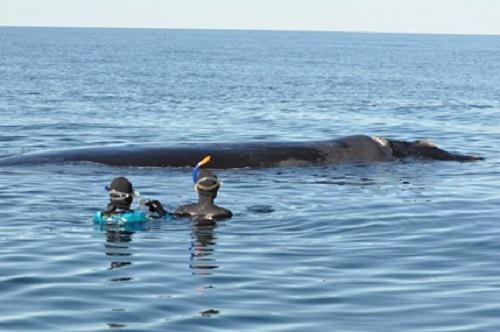Els Vermeulen
Other projects
22 Oct 2008
Project Right Whale – Evaluating the Impact of Tourism Activities on Southern Right Whales in North Patagonia I
The only location in Argentina, and one of the only places in the world, where it is legal to swim with southern right whales (SRWs) under specific restrictions, is inside the Gulf of San Matías, Province of Río Negro. Due to this legalization and the consequential important role of SRWs in the development of this coastal area, especially in the region of San Antonio, this study aims to obtain information on their behavioural reaction to these human approaches.
The results of this study will be an indispensable tool for the implementation of regulations and conservation measurements towards these vulnerable animals in the region.

The effect of tourism based on cetaceans has been the aim of several workshops in the last years pointing out that there is a great individual variety of responses within and among cetacean species particularly while they reproduce, feed or migrate. It was recommended that one should evaluate in each case and species the biggest quantity of possible impact factors (IWC, 1986).
In the province of Río Negro, the SRW was declared a “Natural Monument” with the supposed objectives to protect the species, promote scientific investigation and regulate the non-lethal commercial use of the species in provincial waters. Nevertheless, despite the lack of study, with this law a whale-watching activity was authorised as was a “swim with whales” activity, this last being unique in the country. Globally, swimming with large whales occurs in at least 20 locations, including several (Península Valdés (Argentina) and the Azores) where it is specifically prohibited (Rose et al., 2003).
Understanding the possible consequences of swim-with-whales activities, it is highly necessary to create an accurate management strategy in the province of Río Negro and this way ensure a responsible and sustainable development of the area and the conservation of its natural resources. Such a strategy requires the urgent understanding of various ecological and behavioural aspects of the SRWs visiting the area and the education of the local community
With this study, we will determine the amount of SRWs visiting the study area, their group size and structure and their behaviour (habitat use) in this region. Furthermore, we will be able to determine their residency and site fidelity to the region through photo-identification. Besides the normal, undisturbed behaviour, we will asses the whale reaction to human approaches. We will evaluate if the behavioural patters in BSA are altered by human interactions (boats and swimmers) and to what extend, and whether or not the whale group composition is related to their reaction on tourist boats and/or swimmers. Furthermore we will determine if the initial reaction or age class of the whale to the human approach can serve as a predictor of the overall impact on their behaviour.
The results will allow us to understand the biological implications of “swim-with-whales” and “whale-watching” programs conducted legally but without accurate regulations in Northeast Patagonia.